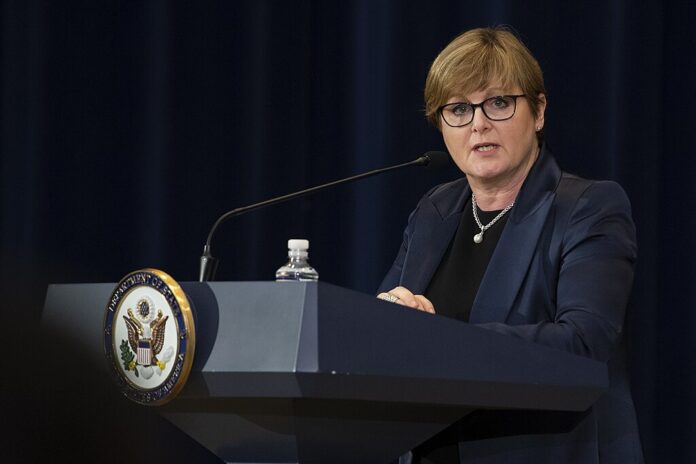Former Australian Federal Police Deputy Commissioner Leanne Close testifies at Linda Reynolds’s defamation trial, expressing surprise that the alleged assault occurred in an unexamined office area
In a dramatic twist to the defamation trial involving Senator Linda Reynolds, former Australian Federal Police Deputy Commissioner Leanne Close took the stand on Thursday. Close’s testimony has added a new layer of complexity to the ongoing legal battle between Reynolds and Brittany Higgins.
Senator Reynolds is suing Higgins and her husband David Sharaz for defamation over social media posts that Reynolds contends imply she mishandled the aftermath of Higgins’s alleged rape. Close, who retired from the AFP in 2020 after a distinguished career, was a key witness brought in by Higgins’s legal team.
Embed from Getty ImagesClose recounted her surprise and concern when she discovered that the meeting she attended with Reynolds in April 2019 occurred in what she described as a “potential crime scene.” This meeting, held roughly two weeks after Higgins’s alleged assault, was conducted in the same office where Reynolds pointed out the alleged incident had taken place.
“I was thinking, we’re sitting in the middle of a potential crime scene that hasn’t been forensically examined,” Close told the WA Supreme Court. She expressed alarm over the fact that no forensic examination was carried out and voiced concern about the security implications of the situation. Close also questioned why an ambulance had not been summoned by the security staff who had found Higgins and noted that Higgins had been inebriated.
This testimony comes amidst a new legal development: Reynolds’s legal team has filed a fresh lawsuit against Higgins. The aim is to access the settlement Higgins received from the federal government, which Reynolds argues was placed into a trust to avoid creditors, including herself. The trust, Power Blazers Pty Ltd, was set up shortly after Higgins received her settlement. The lawsuit seeks to have the funds returned directly to Higgins to simplify Reynolds’s access if she wins the defamation case.
Close also noted the unusual fact that the couch in Reynolds’s office, where the alleged assault reportedly occurred, had been steam cleaned. This cleaning might have removed potential DNA evidence, which, according to Close, could have been significant if reported to the AFP in a timely manner.
Under cross-examination, Close admitted she was unaware of the couch’s actual cleaning status and that Higgins had been referred to a rape crisis center by security staff shortly after the incident. Close expressed relief that Higgins received the referral, highlighting her concern for Higgins’s welfare.
The trial has been marked by emotional testimony and legal manoeuvring. Leanne Close was brought in by Higgins’s lawyer, Rachael Young SC, to clarify the events of the meeting with Reynolds and her chief of staff. However, Reynolds’s lawyer, Martin Bennett, is expected to call Dr. Julio Clavijo, a psychiatrist who examined Higgins, to testify next week. Clavijo’s report was instrumental in the federal government’s payout to Higgins, and Bennett argues that the report’s discrepancies justify Reynolds’s decision to refer the payout to the National Anti-Corruption Commission.
As Justice Paul Tottle deliberates on whether to allow Clavijo’s testimony, the trial continues to unfold with significant implications for all parties involved.
Analysis:
Political Perspective: The defamation trial and the associated lawsuits reflect broader political tensions and concerns about accountability. Senator Linda Reynolds, a former Defence Minister, has been at the centre of controversy following Higgins’s allegations. The trial’s developments, including the scrutiny of the handling of the alleged assault, underscore the political stakes involved in maintaining the integrity of public officials and their offices. Reynolds’s actions, including her legal manoeuvres to access Higgins’s settlement, may influence public perception of political accountability and transparency.
Social Perspective: The trial highlights societal issues surrounding sexual assault and the handling of such allegations. Higgins’s public accusations and the subsequent legal battles bring to light the challenges faced by survivors of sexual violence. The trial also raises questions about the support systems in place for victims and the effectiveness of institutional responses to such claims. The scrutiny of Reynolds’s office and the procedural lapses noted in the testimony reflect ongoing societal debates about how institutions address and manage allegations of sexual misconduct.
Racial Perspective: While the trial itself does not explicitly address racial issues, the handling of high-profile cases involving allegations of misconduct often intersects with broader discussions about race and institutional bias. The focus on individuals in power and their responses to allegations could contribute to discussions about how different racial and ethnic groups experience and report such issues within various institutional frameworks.
Gender Perspective: The case is significant from a gender perspective as it involves a female politician and a female victim of alleged sexual assault. The gender dynamics are evident in the way the trial addresses the credibility of women’s experiences and the societal and institutional responses to such allegations. The legal scrutiny and public discourse surrounding the case highlight ongoing gender-related issues, including the challenges women face in seeking justice and the ways in which gender influences perceptions of credibility and accountability.
Economic Perspective: The economic implications of the trial are significant, particularly concerning the handling of the settlement funds. The fresh lawsuit aimed at accessing Higgins’s settlement reflects economic considerations related to legal disputes and financial accountability. The establishment of the trust and the subsequent legal actions highlight the intersection of financial interests with legal and political strategies, demonstrating how economic factors can influence legal outcomes and public perceptions.
